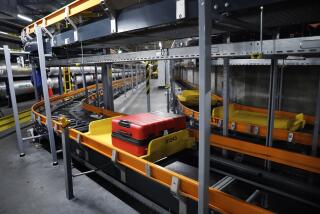Tobacco Executive, 9 Others Charged in Cigarette Smuggling Plot
- Share via
The East Coast regional manager of Brown & Williamson Tobacco Corp. and nine other individuals were indicted Thursday by a federal grand jury in New Orleans on charges that they conspired to defraud the U.S. of tax revenue in a cigarette smuggling scheme.
The indictment culminates a lengthy probe by the U.S. Customs Service, the Justice Department and the Bureau of Alcohol, Tobacco and Firearms.
The charges come as federal grand juries in four other U.S. cities are investigating possible criminal charges against cigarette company officials that could have broader ramifications than the New Orleans case, including possible perjury charges against tobacco executives who gave sworn congressional testimony about the addictive properties of their products.
The New Orleans indictments allege a complicated scheme begun seven years ago.
The indictment charges that Brown & Williamson’s East Coast manager, Michael Bernstein, 50, of Louisville, Ky., and former sales account manager Richard Wingate, 51, of New Orleans helped transfer B&W; cigarettes from a bonded company warehouse in Mobile, Ala., to a private warehouse outside New Orleans from 1989 through 1994. That warehouse, Lamendola’s Bonded Stores, claimed on Louisiana revenue forms to have sold the cigarettes to offshore boats, which would not have required the payment of state and federal taxes.
But the Louisiana company actually sold the cigarettes to a “Vietnamese organization” that then smuggled them over the New York border into Canada, according to the indictment.
In addition to the B&W; executives, the indictment charges four independent cigarette buyers, three warehouse officials and one manager of a marine supply company.
“By selling 24,000 cases of these cigarettes tax-free, the conspirators made over a million dollars in windfall profits,” U.S. Atty. Eddie J. Jordan in New Orleans said in a statement issued with the indictments. Jordan said that a customs agent infiltrated the smuggling organization and discovered that Bernstein, then based in New York, and Wingate, who worked in B&W;’s Sales Specialty Markets division, were involved in the ring.
“By selling to Lamendola’s, Wingate and Bernstein had a multimillion-dollar market for B&W; in an otherwise flat sales area,” Jordan said.
The Times was unable to reach Bernstein or Wingate for comment on the indictment.
Brown & Williamson, the nation’s third-largest tobacco company, issued a formal statement of support for Bernstein but took a different stance in regard to Wingate:
“Brown & Williamson stands by its current employee, Michael Bernstein, who provided sworn testimony to the company that there was no wrongdoing on his part. Mr. Bernstein, who cooperated with B&W;’s own internal investigations of the matter, said federal agents attempted to coerce him into admitting involvement in the alleged scheme and in their interrogation process violated his constitutional rights. Richard Wingate, the former New Orleans sales person, did not cooperate in B&W;’s internal investigation, and therefore the company is uncertain of his alleged involvement.”
The company statement also stressed that the indictments contain no allegations about B&W; or any of its high-ranking executives.
Neither Jordan nor any of the prosecutors working on the case would take questions.
But some anti-tobacco activists asserted that Brown & Williamson benefited from the smuggling scheme even if it had no direct involvement in it.
“The smuggling was used deliberately by the tobacco industry to circumvent and ultimately help destroy the high tobacco tax structure up in Canada,” said Clifford Douglas, a Chicago attorney who has represented industry whistle-blowers.
Douglas and Heather Selin, a policy consultant at the Non-Smokers’ Rights Assn. in Ottawa, said Canada was particularly ripe for smuggled cigarettes in recent years because the Canadian government had imposed very high tobacco taxes in an attempt to raise revenue and decrease consumption.
After taxes were raised, exports of Canadian cigarettes to the United States skyrocketed, and many of those cigarettes were smuggled back into Canada, according to Selin. She said exports shot up even though there traditionally has been little market for Canadian cigarettes in the United States or U.S. cigarettes in Canada because the two countries’ manufacturers use different types of tobacco.
B&W;’s sister company, Imperial Tobacco, based in Montreal, has about two-thirds of the Canadian market.
“The traditional level of exports from Canada to the U.S. was a billion cigarettes or less a year, but at the height of the smuggling era in 1993, it was 14-15 billion,” Selin said. Those cigarettes were exported from Canada to the United States tax-free. “The tobacco companies knew full well that there weren’t a lot of people in Syracuse, Rochester and Buffalo [N.Y.] smoking Canadian cigarettes. Those cigarettes were clearly getting into the hands of smugglers.”
Ultimately, the mass of smuggling prompted the Canadian government to roll back its tobacco taxes. That led to a decline in smuggling and a drop in tax revenue of $1.2 billion in the 1995 fiscal year, according to government figures.
If convicted, Bernstein, Wingate and other defendants face a maximum of 10 years in prison, fines totaling $500,000 and forfeiture of illegal profits. Two other figures in the case not connected with B&W; already have pleaded guilty in Canada to charges related to the alleged scheme.
More to Read
Sign up for Essential California
The most important California stories and recommendations in your inbox every morning.
You may occasionally receive promotional content from the Los Angeles Times.













